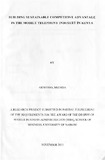| dc.description.abstract | Increased globalization and liberalization has increased turbulence in the environmental
changes experienced by firms today presenting greater need to establish sustainable
competitive advantage if they are to remain in business. To succeed in achieving
sustainable competitive advantage firms must provide what buyers will perceive to be of
superior value. Availability of many players provides customers with an array of options
to choose from and therefore to capture their interest, it entails either a good quality
product at a low price or a better quality product that is worth a premium price. While it
is easy to gain sustainable competitive advantage, the challenge is sustaining market
leadership. The objectives of the study were to determine the basis of sustainable
competitive advantage in the mobile telephony industry and to analyze factors
influencing sustainable competitive advantage in the mobile telephony industry.
The study adopted the survey research design picking eight departmental heads from each
company comprising a target population of 32 respondents. The research employed a
semi structured questionnaire to collect primary data which was administered through the
drop and pick method. Descriptive statistics and content analysis were used to analyse the
data. From the findings the study concludes that internal sources of competitive
advantage are more important and relevant than the external sources. Knowledge is
increasingly becoming a major source of competitive advantage as it is valuable rare,
non-substitutable and imperfectly imitable. While the development of human resources is
critical, it is the creation of a learning organisation to enhance the sharing and spread of
knowledge among all employees rather than letting it reside in the heads of a few who
could easily take it away and perhaps move over to competition. Functional capabilities
such as finance, production, procurement, product or customer support, low cost or high
volume production, strong marketing strategy, management team and operations and
service quality can easily be decoded and acquired by competitors in the open market
unlike the hard to decode distinctive competencies. | en |

